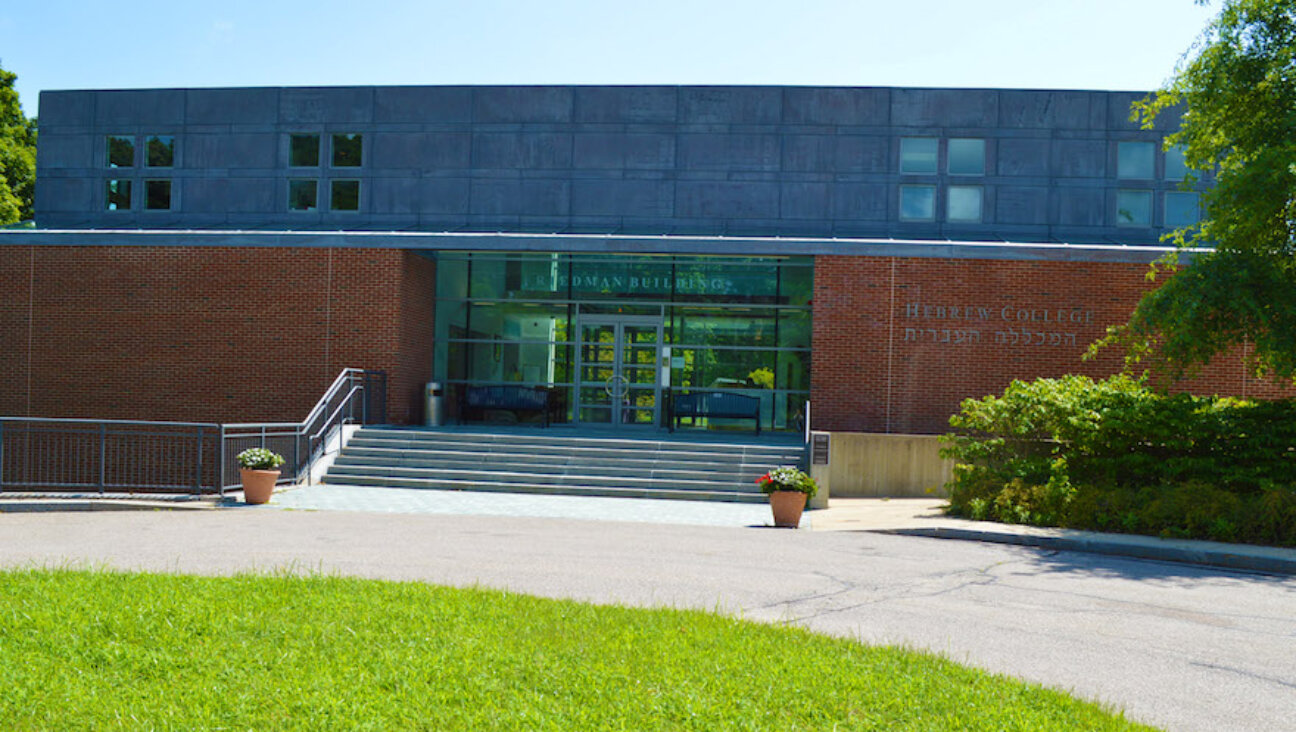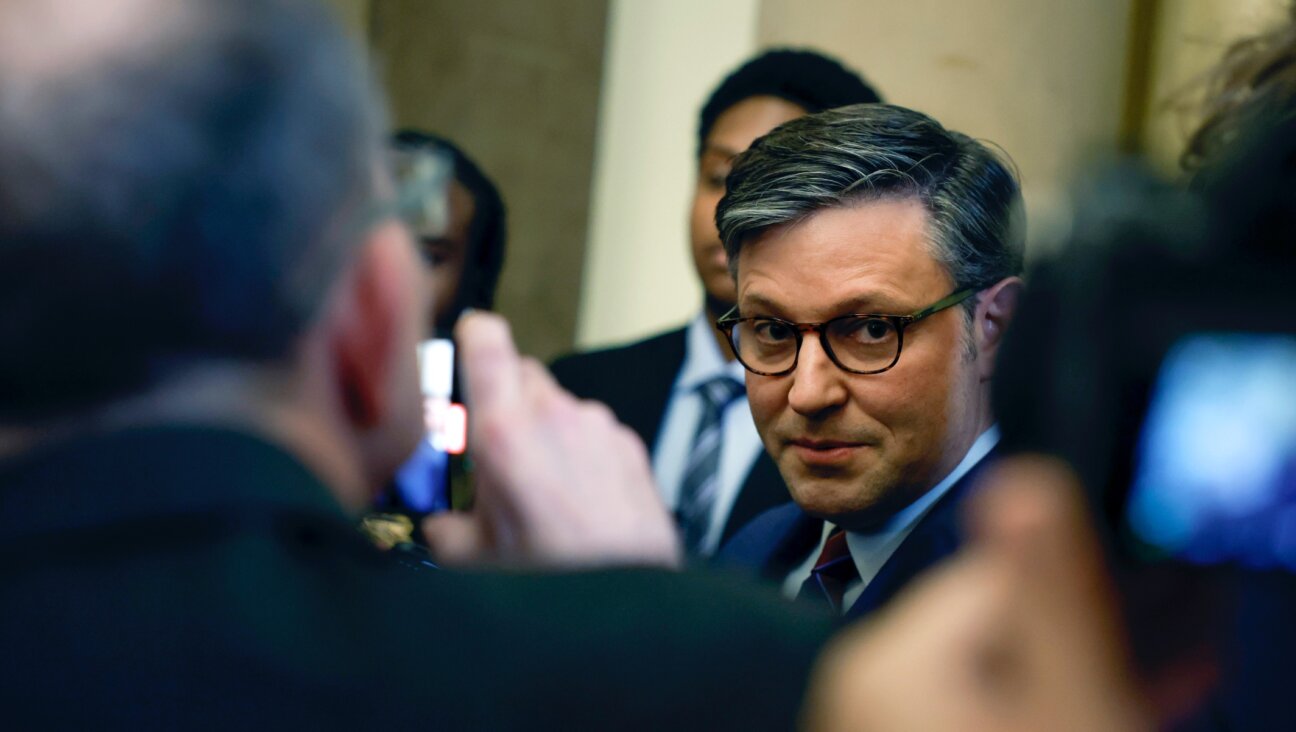October 24, 2003
Ford Foundation Backs Proponents of Peace
In his October 16 cover story, author Edwin Black implies that the Ford Foundation was responsible for anti-Israel sentiment at the 2001 United Nations World Conference Against Racism in Durban, South Africa, and that Ford is negligent in its oversight of how grant monies are used (“Ford Foundation Aided Groups Behind Biased Durban Parley”).
The Foundation strongly disagrees and takes exception to the inflammatory headline.
For more than half a century, Ford grant making around the world has sought to strengthen democratic values, reduce poverty and injustice, promote international cooperation and advance human achievement. In the Middle East, Ford funds organizations seeking to build bridges between Israeli and Palestinian society, promote human rights and strengthen the democratic institutions essential to achieve a lasting peace in the region. Ford supports religious tolerance and understanding, and abhors antisemitism and other forms of hate speech, violence or discrimination. The foundation has never supported — and would never support — religious, ethnic or other forms of bigotry.
Ford has funded organizations from dozens of countries that participated in the Durban conference. We were pleased to help focus world attention on such issues as the historical legacy of the Atlantic slave trade as well as the daily discrimination against the Roma in Central and Eastern Europe and some 130 million Dalits in South Asia. Like many, we were shocked by the extremist rhetoric of some participants on Israeli-Palestinian issues and dismayed that it overshadowed the conference’s positive achievements. Separate from Durban, we have held frank and productive discussions with Palestinian grantees, including the Palestinian NGO Network, an organization that Black cites concerning images and messages that we deemed inflammatory.
Ford shares the commitment of the American government officials and others whom Black cites to insure that grant funds are not diverted for terrorist and other purposes. We comply fully with all requirements of American law. We check every grant before we approve it, before we issue a check and periodically during the life of the grant to ensure that no grant supports any organization on various lists of terrorist suspects, including that of the Treasury Department’s Office of Foreign Assets Control. None of our grantees appears on that list. Even Black acknowledges that “this investigation has not identified any instances of Ford monies being linked to terrorism.”
Ford’s work in the Palestinian territories reflects its belief that a just and lasting resolution of the Israeli-Palestinian conflict is vitally important to the region and the peoples directly affected. Indeed, as Black notes in his story, Ford recently made a $20 million grant to the New Israel Fund to support organizations in Israel that are working to strengthen the country’s democracy and advance human rights, equality and peace for its citizens.
Bradford Smith
Vice President
Ford Foundation
New York, N.Y
Edwin Black’s important cover story investigating the Ford Foundation’s relationship with anti-Israeli Palestinian organizations unfortunately misleads about the United Nations’ Durban conference in a manner that has unfortunately become common knowledge through repetition.
The first sentence of the article describes the thousands of human rights activists who came to the conference hoping to address “racial injustices plaguing humanity, from Rwanda to Sri Lanka to the United States.” So far so good. But the next sentence takes us into a patent falsehood: “Instead, anti-Israeli agitation, anti-Zionist propaganda and blatant antisemitism” permeated the event.
I was there and witnessed the anti-Zionist propaganda with my own eyes. The events at Durban normalized and spread a previously unacceptable form of anti-Zionist propaganda. Of that there can be no doubt. But please notice the first word of that second sentence— “Instead” — arguing that the anti-racism work at the center of the conference was somehow replaced by the anti-Zionism and, thus, was never addressed. Instead, he should have said “And,” as thousands of human rights activists came together to address local and international racism and there was a strong anti-Zionist and antisemitic presence.
The Jewish community needs to continue to look back to the world conference held in Durban and seek to understand how antisemitic and anti-Zionist forces were so effective at getting out their message. At the same time, we need to properly understand the context for those efforts and appreciate in the end the conference succeeded in helping local activists globalize their struggles against racism and world governments finally and unequivocally declared slavery a “crime against humanity.” Until we do, we will continue to allow the antisemitism to hijack our attention from our common struggles against all forms of discrimination.
Barry Joseph
Brooklyn, N.Y.
Speaking Truth to Bush
After reading the October 10 editorial on Rabbi Amy Schwartzman, I found additional justification — as if this was needed — for continuing to renew my subscription to your great paper (“Speaking Truth to Bush”). Although I sometimes disagree with your editorials, I can only urge you to continue with them, regardless of what some narrow-minded letter writers think.
Regarding Schwartzman, I am proud of her speaking out at the White House meeting of Jewish community representatives, and I disagree completely with those who were afraid or found it inappropriate to speak about hunger in America — which, by the way, is a Jewish issue.
The media is full of discussions on terrorism and security. What was needed was a discussion, if that is possible with this president, on social issues, homelessness and loss of our basic freedoms.
More power to the Forward and mainly to Schwartzman for taking that one-time opportunity to speak out in the tradition of our Prophets of thousand of years ago for justice for the voiceless poor in our midst.
Hans Cherney
Kensington, Md.
Jewish Needy Declining
An October 10 article describes increasing levels of poverty among American Jews, and reports that the 2000-01 National Jewish Population Survey represents “the first effort in at least a quarter-century to determine the extent of economic need among Jews nationwide” (“Poverty Figures Lift Veil, a Bit, On Ills of Needy”).
The Forward’s main assertion is contrary to the results of earlier NJPS surveys, which provide clear evidence of a long-term decline in Jewish poverty levels. From 1969 to 1989, the proportion of American Jewish households with low incomes — $12,500 or less, in 1989 dollars — declined from 15% to 9%. Moreover, the economic well-being of certain groups improved even more markedly. Among older Jewish households — those with a majority of adults aged 65 and older — the percentage with low incomes fell from 54% in 1969 to 20% in 1989. Among Jewish households with no full-time workers, the percentage with low incomes declined from 45% to 24%.
These findings, among others, are presented in our 1997 study in the Journal of Economic and Social Measurement (“American Jewish Household Income, 1969 and 1989”). Our 1998 follow-up study in Sociological Inquiry (“Ethnic and Religious Components of the Jewish Income Advantage, 1969 and 1989”) demonstrates that the Jewish income advantage is more closely linked to Jewish ethnicity than Jewish religion. Both analyses make use of national samples representing the entire Jewish population — those who were active in Jewish religious and communal activities as well as those who were not.
We have not evaluated the results of the latest NJPS, and we therefore cannot comment on the most recent trends. Overall, however, we were disappointed to see that the Forward relied almost exclusively on local surveys that may or may not be representative of the Jewish population in general. Contrary to his claim, several researchers have devoted substantial attention to this topic. Our own work appears prominently in at least three major bibliographic databases, so we were puzzled by the Forward’s omission of the several empirical studies based on earlier NJPS surveys.
Esther Wilder
Lehman College and the CUNY Graduate Center
Bronx, N.Y.
William Walters
St. Lawrence University
Canton, N.Y.
Punt ‘Green Footballs’
Gil Troy’s October 17 opinion column on his branding as a “Zionist American Jew” by the Cork Palestine Solidarity Campaign was indeed chilling (“An Internet Version of the Nazi Yellow Star).
However, in order for his words to have full effect, Troy must first denounce Little Green Footballs, the web log he references at length without any context. This is the Web site that has given us these choice tidbits, among others:
On Rachel Corrie’s death: “I dance on her grave. She and her ilk are a threat to Israel, the U.S., and ultimately the entire human race.”
On a bombing that killed 23 people, including four children: “I’m not for indiscriminate violence, but I think Israel should just start bombing the Gaza strip until nothing moves within.”
On Edward Said’s death: “I for one am glad he is dead, and if there is any justice in this world, he’ll burn in Hell, right alongside Göbbels.”
In fact, following Troy’s logic, I went from Little Green Footballs to Palestine Facts, a linked site, which linked to the Yesha settler’s site, to Arutz Sheva, a far-right site which has often called for forced transfer of the Palestinians, and a variety of sites that delegitimize the Palestinians by using quotes around the word, as if they don’t exist.
Truly, marking somebody for their beliefs alone is a disgusting habit. But in order for Troy’s complaint to be believable, he must shake his faith in Little Green Footballs, a horrible site that is the bane of pro-peace Jews like myself.
Yoni Reinberg
Philadelphia, Pa.

I hope you appreciated this article. Before you go, I’d like to ask you to please support the Forward’s award-winning journalism this Passover.
In this age of misinformation, our work is needed like never before. We report on the news that matters most to American Jews, driven by truth, not ideology.
At a time when newsrooms are closing or cutting back, the Forward has removed its paywall. That means for the first time in our 126-year history, Forward journalism is free to everyone, everywhere. With an ongoing war, rising antisemitism, and a flood of disinformation that may affect the upcoming election, we believe that free and open access to Jewish journalism is imperative.
Readers like you make it all possible. Right now, we’re in the middle of our Passover Pledge Drive and we need 500 people to step up and make a gift to sustain our trustworthy, independent journalism.
Make a gift of any size and become a Forward member today. You’ll support our mission to tell the American Jewish story fully and fairly.
— Rachel Fishman Feddersen, Publisher and CEO
Join our mission to tell the Jewish story fully and fairly.
Our Goal: 500 gifts during our Passover Pledge Drive!
























